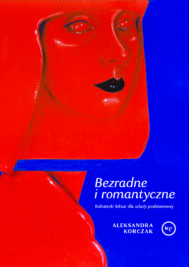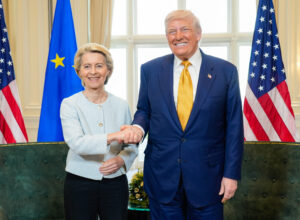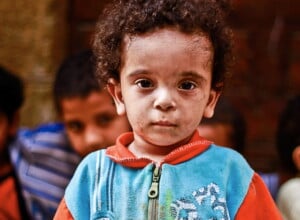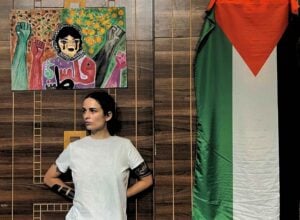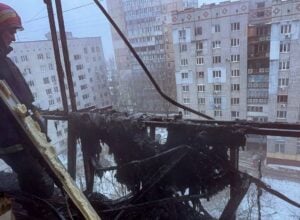Trybuny w Paryżu były wypełnione po brzegi od samego rana do późnego wieczora, niezależnie od popularności dyscypliny, czy była na igrzyskach „od zawsze” czy właśnie debiutowała, a nawet bez względu na szanse medalowe gospodarzy. Podobnie jak w przypadku wzmożonego zainteresowania Eurowizją, wydaje się, że Europa (i cały świat) bardzo potrzebowała radosnej i wspólnej celebracji w ramach odtrutki po smutnych czasach covidowej izolacji. A Francuzi nam to umożliwili, przygotowując świetny show w swojej pięknej stolicy.
Nie byłoby to możliwe, gdyby nie praca dziesiątek tysięcy ludzi: wolontariuszy, kierowców komunikacji publicznej, służb porządkowych i osób dbających o bezpieczeństwo. Jeszcze przed imprezą można było obawiać się słabej organizacji w związku z ogromną liczbą gości, którzy odwiedzą stolicę Francji, jednak dzięki ciężkiej pracy wszystkich zaangażowanych, wszystko przebiegło sprawnie. Miałam wręcz wrażenie, że Paryż był mniej zatłoczony niż zazwyczaj – zapewne przyczynił się do tego wyjazd wielu mieszkańców z miasta na czas igrzysk. Wciąż jednak tłumy ludzi wielu narodowości i mówiących różnymi językami bez problemu dostawały się na miejsca wydarzeń, żeby wspólnie kibicować. Wspólnie, a więc nagradzając aplauzem udane próby, zagrania czy występy wszystkich sportowców, ciesząc się medalami koreańskich łuczniczek, belgijskich siedmioboistek czy holenderskich biegaczek, ale i smucąc po nieudanych próbach i doceniając każdy z osiągniętych wyników.
From Paris with love
Nareszcie fani mogli na żywo doświadczyć wzruszających momentów, które są nieodzowną częścią święta sportu, jakim są Igrzyska Olimpijskie. Jak wtedy, gdy Mondo Duplantis bił rekord świata przed osiemdziesięciotysięczną publicznością na Stade de France. Lub gdy na tej samej arenie Antoine Dupont poprowadził reprezentację Francji w rugby do zdobycia pierwszego złota. Oraz gdy Sifan Hassan wygrywała maraton kilkadziesiąt godzin po zdobyciu medalu na 10 tysięcy metrów, a następnie odbierała wywalczony medal w trakcie ceremonii zamknięcia. Nigdy dotychczas ceremonia zamknięcia nie wyróżniała wyłącznie zwyciężczyń kobiecego biegu.
Czwarta w biegu na 3000 metrów Alice Finot po dobiegnięciu do mety oświadczyła się swojemu partnerowi, wręczając mu swoją olimpijską przypinkę. Ostatecznie igrzyska w Paryżu pobiły rekord, jeśli chodzi o liczbę oświadczyn. Urocze momenty przeżywaliśmy również wraz z już zaślubionymi parami.
Legenda skoków do wody Tom Daley zdobywał srebro na swoich piątych igrzyskach, a z trybun dopingował go mąż z dziećmi. Brittney Grinner, która wróciła do reprezentacji po pobycie w rosyjskim więzieniu, cieszyła się ze złota w koszykówce ze swoją żoną. Zwyciężczyni skoku w dal Tara Davis-Woodhall świętowała z mężem, który lada moment będzie reprezentował USA na igrzyskach paraolimpijskich. Mistrz olimpijski w skoku wzwyż z Tokio Gianmarco Tamberi podczas pełnienia obowiązków chorążego reprezentacji Włoch zgubił obrączkę i w ramach przeprosin napisał dla swojej żony poemat.
Zdrowe ciało i zdrowy duch
Atmosfera i udział kibiców to nie tylko fajny akcent rywalizacji, ładny obrazek w telewizji i miłe wspomnienia. To także wsparcie dla uczestniczących w rywalizacji, często bardzo istotne dla ich dobrostanu. Jedna z największych gwiazd i faworytka większości konkurencji gimnastycznych, Simone Biles, tuż po przyjeździe na poprzednie igrzyska do Tokio wycofała się z rywalizacji ze względu na „twisties”. To jedno z określeń, których zawodowi sportowcy używają, żeby opisać nagłą utratę umiejętności sportowych dotychczas podstawowych w ich dyscyplinie, która nie jest spowodowana kontuzją i najprawdopodobniej ma podłoże psychosomatyczne.
Będąca w centrum uwagi mediów i kibiców Biles od początku otwarcie mówiła o tym, z czym się zmaga. Podkreślała, że izolacja wymagana na tej imprezie znacząco przyczyniła się do jej problemów. Wskazywała też na swoje doświadczenia przemocy seksualnej ze strony lekarza pracującego z reprezentacją i bierność sportowych władz.
Jej otwartość ogromnie przyczyniła się do normalizacji dyskusji o problemach psychicznych w sporcie i poza nim. Za jej przykładem, wielu innych sportowców zaczęło mówić o własnych zmaganiach z „twisties”, a także z depresją czy zaburzeniami lękowymi. W Paryżu Simone Biles wróciła na arenę olimpijską, podkreślając że bez psychoterapii nie byłaby w stanie tego dokonać. Zdobyła trzy złota i srebro, ale bohaterką została bez względu na wyniki sportowe.
Igrzyska kobiet
Pierwszy raz w historii liczba rywalizujących na igrzyskach kobiet i mężczyzn była równa. Trudno jednak nie oprzeć się wrażeniu, że były to bardziej niż kiedykolwiek igrzyska kobiet. Z pewnością było tak z polskiej perspektywy – aż 8 krążków przywiozły kobiety, w tym Ola Mirosław – jedyne złoto. Co ciekawe, dla zwyciężających klasyfikację medalową Stanów Zjednoczonych kobiety zdobyły dwa razy więcej złotych medali niż mężczyźni, na czele z multimedalistkami: Simone Biles, świetnymi pływaczkami, w tym legendarną Katie Ledecky czy biegaczką Gabby Thomas. Nic więc dziwnego, że w polskim przekazie medialnym królowały właśnie sportsmenki.
Kobiety pochodzące z krajów, które dotychczas nie odnosiły sukcesów olimpijskich i tym samym nie dysponowały zapleczem porównywalnym z wieloma innymi reprezentacjami, również tworzyły w Paryżu historię. Thea LaFond z Dominiki, Adriana Ruano z Gwatemali i Julian Alfred z Saint Lucii zdobywały pierwsze w historii złote medale dla swoich krajów, a Cindy Gamba – historyczny brąz dla reprezentacji uchodźców. Trzeba dodać, że jedna taka sytuacja miała też miejsce w konkurencji męskiej – pierwsze mistrzostwo olimpijskie dla swojego kraju zdobył Leslie Tebogo z Botswany.
Organizatorzy paryskich igrzysk zadbali o startujące mamy – w wiosce olimpijskiej po raz pierwszy pojawił się żłobek, który otwierała Alyson Felix. Ta jedenastokrotna medalistka olimpijska, a obecnie członkini Międzynarodowego Komitetu Olimpijskiego, jest działaczką na rzecz dostępności i przystosowania zawodowego sportu dla kobiet z dziećmi. Na paryskich arenach byłyśmy świadkami tego, jak Adrianna Sułek stawała na starcie zmagań siedmiobojowych pół roku po urodzeniu synka, a szpadzistka Nada Hafez i łuczniczka Yaylagul Ramazanowa występowały nawet będąc w ciąży.
Półfinał siatkarzy
Szczęśliwie udało mi się zdobyć bilety na półfinał w siatkówce mężczyzn jeszcze przed igrzyskami. Były kupowane z nadzieją, ale i obawą o to, czy polscy siatkarze nie odpadną w ćwierćfinale, jak wydarzyło się w pięciu poprzednich turniejach olimpijskich. Nie odpadli. Ta drużyna, zdobywcy każdego możliwego lauru w siatkówce poza medalem olimpijskim, stanęła przed ogromną szansą. Wygrana gwarantowała pierwszy za ich (oraz za mojego) życia medal w sporcie zespołowym na igrzyskach olimpijskich dla Polski.
Wiedziałam więc, że będzie to mecz ważny, mogłam też spodziewać się, że będzie trudny. Ale ostatecznie zostałam świadkinią jednego z najbardziej emocjonujących wydarzeń w historii polskiego sportu. Po przegranej do 14. w trzecim secie, wielu mogło się wydawać, że targana kontuzjami polska drużyna jest rozbita i już się w tym meczu nie podniesie. Nic bardziej mylnego. Kurek, Leon i spółka wygrali po horrorze i reprezentacja Polski awansowała do finału olimpijskiego w siatkówce po raz pierwszy od prawie 50 lat.
Ceremonia otwarcia
Dzięki wyjazdowi do Francji ominęła mnie większość dramy związanej ze skandalizującym (zdaniem niektórych) otwarciem igrzysk. Dyskusja rozgorzała przede wszystkim na temat rzekomej parodii Ostatniej Wieczerzy. Choć autorzy ceremonii wskazywali na zupełnie niebiblijną inspirację ucztą bogów Olimpu, okazało się, że nie wolno posadzić grupy ludzi po jednej stronie długiego stołu – oczywiście jeśli noszą drag. Gdy bowiem przedstawiano tak mafiozów z Rodziny Soprano, czy postaci z Simpsonów, South Parku czy Zagubionych to oburzenia nie zaobserwowano. A może po prostu nie było wtedy jeszcze X. Ale teraz już istnieje i niestety wielu z występujących artystów padło ofiarami internetowego nękania.
Odkładając na bok tę burzę w szklance wody, trzeba przyznać że Francuzi, po raz pierwszy wychodząc z ceremonią poza stadion i wykorzystując piękno Paryża jako tło, ale i bohatera ceremonii, stworzyli niezapomniane widowisko. Ja z pewnością zapamiętam odtworzenie „Wolności wiodącej lud na barykady”, odcięte głowy śpiewające do muzyki zespołu Gojira, hołd dla siostrzeństwa oraz osobę podążającą na metalowym rumaku po Sekwanie z flagą olimpijską. Choć paradoksalnie – ze względu na rozmach oraz pogodę – było to jedyne wydarzenie igrzysk, które akurat lepiej oglądało się w telewizji niż na żywo.
Eksperci od kobiecości
Niestety nie obyło się bez – dość spodziewanej, biorąc pod uwagę obecny stan debaty publicznej – kontrowersji dotyczącej udziału rzekomych „mężczyzn” w konkurencjach kobiecych. Do chóru niezadowolonych dołączyli prezydent i wielu innych polityków, szef PKOl, a także stali uczestnicy tego typu „dyskusji” Elon Musk i J.K. Rowling. Na łamach Krytyki Politycznej sprawę omawiali Kajetan Woźnikowski i Patrycja Wieczorkiewicz.
Wszystko to doprowadziło do sytuacji groteskowych – jak wtedy gdy judoczka Angelika Szymańska po przegranej z Priscą Alcaraz musiała stawać w jej obronie, gdyż niektórzy „zauważyli”, jakoby Meksykanka była „tak naprawdę” mężczyzną i dopuściła się oszustwa.
Doprowadziło też do sytuacji przerażających – jak nękanie, którego doświadczyły Imane Khelif i Lin Yu-ting. Tuż po igrzyskach Khelif zawiadomiła francuskie władze o popełnieniu przestępstwa uporczywego nękania, wymieniając w nim tweety m.in. Rowling i Muska. W tle mamy Międzynarodowe Stowarzyszenie Boksu (IBA), które już w 2019 roku ze względu na korupcję i niejasne powiązania z organizacjami przestępczymi zostało odsunięte od zawiadywania olimpijskimi zmaganiami bokserskimi. Obecnie organizacja jest finansowana przez Gazprom, a jej szef pozostaje w bliskich stosunkach z Władimirem Putinem. IBA zasłynęła np. z zawieszenia Ukrainy w prawach członkowskich (w 2022 roku!) i jednocześnie zezwalania na udział w mistrzostwach reprezentacji Rosji i Białorusi. Z tego powodu zawody, na których miały miejsce dyskwalifikacje Khelif i Yu-ting, były bojkotowane przez 19 federacji z całego świata, w tym polską. Ale co najistotniejsze – ze względu na poufność informacji medycznych, nikt spośród tak chętnie komentujących tę sprawę nie wie, co konkretnie wykazały „testy płci” przeprowadzone przez IBU, ani nawet na czym polegały.
Dom Polski nie dla kibiców
Otwarcie Domu Polskiego w Paryżu było bardzo dobrym pomysłem – na papierze. Miło, aby kibice mogli przyjść gdzieś, gdzie można obejrzeć zawody na dużym ekranie i pokibicować w większej grupie. Co prawda bilet kosztował 130 zł od osoby, ale to i tak znacząco mniej niż wejściówki do podobnych stref kibica innych reprezentacji, jak USA czy Niemcy. Wiele osób zaangażowanych w projekt zrobiło świetną robotę, odwiedzający mogli spróbować lokalnych przysmaków, napić się zimnych napojów, zrobić tymczasowy tatuaż czy wypełnić quiz z nagrodami. Istniała też możliwość gry w koszykówkę i w ping-ponga oraz dwa wielkie ekrany pokazujące aktualne wydarzenia na igrzyskach. Wizyta tam pozostawiła mnie jednak z niesmakiem.
Tak się złożyło, że odwiedziłam to miejsce w dniu, gdy swój medal odbierała Iga Świątek. Okazało się więc, że przyjedzie, aby spotkać się z kibicami. I wtedy zczął się przedziwny spektakl.
Na początek ogrodzono wszystkich odwiedzających od „sceny” za pomocą barierek. Przeszło mi przez myśl, że to chyba przesadne środki ostrożności – byliśmy przecież bardzo dokładnie przeszukiwani przy wejściu na teren wydarzenia. Następnie wyłączono prezentowane na ekranach zmagania sportowe, a na podwyższenie znajdujące się przed nimi wyszła osoba, która zapowiedziała, że niedługo przyjdzie Iga Świątek, a potem przez kolejne czterdzieści pięć minut uczyła nas jak mamy ją „powitać”, co krzyczeć, jak klaskać… Czy naprawdę nie można zaufać zaangażowanym kibicom, że będą potrafili bić brawo medalistce olimpijskiej? Po tym przydługim szkoleniu przyprowadzono skonsternowaną Igę, a wraz z jej pojawieniem się zjawił się również prezes PKOl, który oczywiście wygłosił przemówienie, wręczył jej biało-czerwone kwiaty i zapozował do zdjęć. Następnie w końcu pozwolono dojść do głosu Idze, która podziękowała i zachęciła do kibicowania innym polskim sportowcom.
Trwało to krótko, co zrozumiałe, w końcu zawodniczka miała za sobą ciężki turniej i potrzebowała odpoczynku. Ale czy w związku z tym mogła wyjść i spędzić czas według swojego uznania? Gdzieżby! Przygotowania do całego przedstawienia trwały półtorej godziny, żeby Iga spędziła na scenie 5 minut. Następnie zabrano ją „na górę” (na kilka godzin), prawdopodobnie po to, aby wszyscy działacze mogli się odpowiednio polansować i porobić fotki. Przy schodach za to ustawiono osoby, które broniły wstępu dzieciom, które chciały zrobić sobie zdjęcie czy wziąć autograf. Gdy wychodziłam, dzieci nadal tam czekały. A ja nigdy więcej już tam nie poszłam.
Polskie związki sportowe
Pewnym plusem tego, że występy wielu spośród polskich sportowców w Paryżu są oceniane jako słabe, jest obietnica przyjrzenia się funkcjonowaniu polskich związków sportowych, które przecież pobierają miliony złotych z budżetu państwa. Pomimo tego, polscy kolarze nie mają finansowania na zgrupowania kadry, a kombinezony dostają dzień przed startem. Na igrzyska według doniesień medialnych jeżdżą rodziny działaczy związku zapaśniczego, ale nie może pojechać sparingpartner kandydata do medalu. Oby na obietnicy się nie skończyło, choć trudno w nią uwierzyć w kraju, gdzie odkąd pamiętam wybitni sportowcy muszą walczyć z systemem, i gdzie (niemałe) środki na finansowanie sportu kierowane są często na finansowanie wycieczek działaczy sportowych i ich rodzin.
Jeśli ktoś oglądał igrzyska w telewizji, to zapewne widział w trakcie bloku reklamowego spot, w którym wybitne polskie sportsmenki wskazywały na niski udział kobiet w zarządzaniu sportem. Na 69 związków sportowych w Polsce, w 65 rządzą mężczyźni. Poza tym, że jak widać sport zawodowy to jedna z dziedzin, gdzie seksizm trzyma się mocno (więcej pisze o tym Agnieszka Wiśniewska), jest to symbol tego, jak archaicznie te organizacje wyglądają. Nie inaczej jest z Polskim Komitetem Olimpijskim, w którym oczywiście również przez 105 lat jego istnienia nie rządziła żadna kobieta. Nawet wielka Irena Szewińska była tylko wiceprezeską.
**
Karolina Wiśniowska – absolwentka prawa oraz filozofii na Uniwersytecie Jagiellońskim. Autorka tekstów naukowych i publicystycznych z zakresu bioetyki, filozofii społecznej i filozofii prawa. Prywatnie fanka brytyjskiej popkultury i kibicka sportowa.

 Wspieraj
Wspieraj 

 Wspieraj
Wspieraj  Wydawnictwo
Wydawnictwo 
 Zaloguj się
Zaloguj się 





